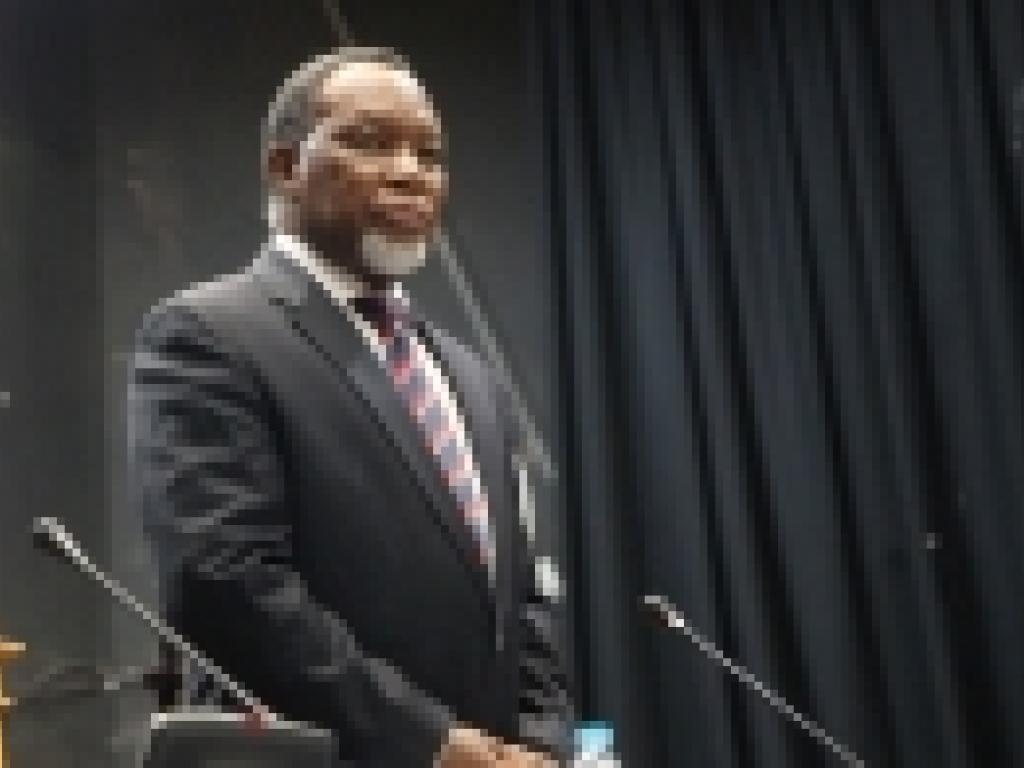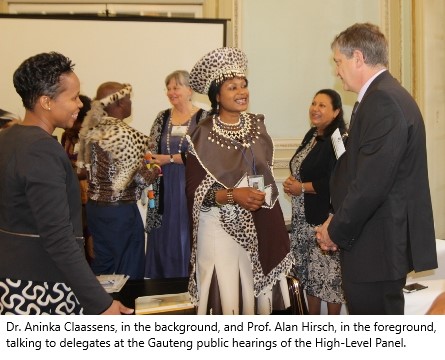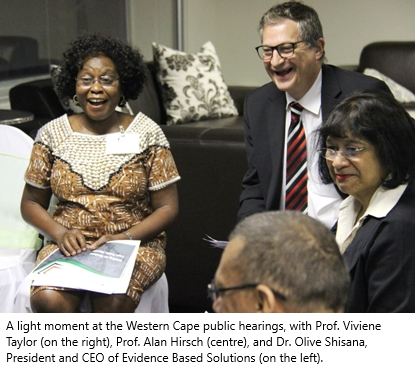UCT Well Represented on the Motlanthe High-Level Panel

In 2015, an ambitious albeit very important parliamentary process was initiated by the legislature’s Speakers’ Forum: to assess how effective post-1994 legislation has been in contributing to the transformation agenda of the developmental state, and the possible unintended consequences of these laws. This undertaking was led by a high-level panel (HLP) of eminent South Africans, headed by former President Kgalema Motlanthe. The panel produced a lengthy 601-page report that has been in the headlines sporadically since its release in November 2017.
What is less known, perhaps, is that four of the 14 panel members were from UCT, while five other UCT scholars and a PhD student also contributed to expert reports commissioned by the Panel. The Panel members from UCT are all members of the PII, and we spoke to them about their experiences of this process.
The HLP’s work spanned 21 months involving a massive process of consultation and review: 16 commissioned expert reports, 15 expert roundtables/workshop, and 27 public hearings – three in each province to deal with the Panel’s three main thematic areas of review. These areas are critical to South Africa’s transformation: poverty, unemployment and the equitable distribution of wealth; land reform – restitution, redistribution and security of tenure; and social cohesion and nation-building.
Helping to make sense of the country’s progress in these areas were UCT academics Prof. Haroon Bhorat (Development Policy Research Unit, School of Economics); Dr. Aninka Claassens (Land and Accountability Research Centre, Department of Public Law); Prof. Alan Hirsch (The Nelson Mandela School of Public Governance); and Prof. Viviene Taylor (Department of Social Development).
“It really was tribute to UCT that four of the Panel members were from the University”, says Prof. Hirsch. But, as is the nature of such multi-disciplinary processes, it was a challenging task as the various members had different perspectives on what were most important to focus on, Prof. Bhorat points out. “But that is not a bad thing, though, as it provided the environment to challenge, contest and engage robustly. It was a very rich environment in terms of the skills sets and the experience in the room.”
The importance of an evidence base
The mandate of the HLP was to review the post-1994 legislation; assess their implementation; identify gaps; and propose steps to identifying laws that need strengthening, amending or change.
Prof. Taylor elaborates that “not all the panellists were of one mind on how we should approach the work. But, interestingly, we did agree that we would use an evidence-based approach by drawing on research already done, or research gaps to explore and, if necessary, commission more”. The research was backed up by the voices of people from all walks of life across the country who made inputs at the public hearings.
Steady leadership during challenging times
All four Panel members from UCT speak with great praise of former President Motlanthe’s leadership in the process. It was an uncertain and tumultuous period, they point out, as evidence of state capture was beginning to emerge while the country was reeling from the controversial firing of both the Minister and Deputy Minister of Finance.
“Many of us were ambivalent as it was not clear into whose hands the report would go because the country at the time didn’t have the kind of government that would be able to respond to the report constructively”, recalls Prof. Hirsch. “But, because of the Panel’s calibre under the leadership of the former President, we thought it was worth participating while hoping that, by the time the report is completed, there would be a Parliament and government that would be able to engage with the report effectively.”
Of course, three months after the final report was handed to the Speakers’ Forum in November 2017, major changes took place at the most senior level of government leadership. And, in another fortuitous twist, two of the people involved in the work of the Panel – Dr. Olive Shisana and Dr. Trudi Makhaya (who prepared the final report with the guidance of the Panel) – are now advisors to President Cyril Ramaphosa.
Authentically articulating the problems
One aspect of serving on the Panel that stands out for the UCT professors is the public hearings that were held across the country. They were, in Prof. Hirsch’s words, an “incredible experience”, and Prof. Taylor found the issues raised by people “were really powerful” albeit “pretty devastating” according to Dr. Claassens.

“Just the process of people coming to the public hearing was eye-opening for ordinary people, to hear what other people were saying. It created a forum where people were beginning to understand that their problems were shared, and structural. They really spoke out, they were forthright, they provided names and details and they basically were furious with government for – in their eyes – betraying them”, says Dr. Claassens of the land reform hearings held by the sub-committee that she headed. “The scale of the problems was just very, very daunting because you get a sense that you need a complete system overhaul at every single level. I think that was quite devastating for all panellists to see how serious and how entrenched the problems really are and that, fundamentally, it’s a lack of accountability by officials at every level.”
Prof. Hirsch remembers the most striking hearing that he attended – in Limpopo province – where (as at other hearings) issues of land and the role of chiefs came to the fore very strongly: “They spoke quite bravely in the presence of the chiefs about their concerns about mismanagement by traditional leaders in the former homelands. A lot of the issues that people spoke out on was about things they don’t easily get the opportunity to express. And I think the fact that we recorded it in a lot of detail, and that these recordings are available online, is great.”
For many members of the social cohesion and nation-building committee that Prof. Taylor served on “it was surprising to note how people identified and made the links between their poverty and lack of dignity due to impoverishment with their inability to see themselves as having a central place in a South Africa that is developing. That was really a very important take away message from the process.”
Hopes for uptake
Now that the country has entered a “clearer” political phase, says Prof. Bhorat, the HLP Report “provides a very interesting seedbed” from which to pick recommendations. Dr. Claassens concurs: “Once things have stabilised politically, and the factions who benefitted from corruption no longer have the same amount of power, I think more and more of the panel’s recommendation will be taken up.”
She says the feedback from the Speakers’ Forum has highlighted the value of the report in enabling the parliamentarians to see how key issues for the country fit together and are part of a structural whole that needs a structural solution. Not only did the report identify the problems clearly, based on the evidence, but the Panel also looked at the alternatives and, in fact, drafted indicative bills as was requested by the Speakers Forum. “And I think that is what will stand the test of time.”
By describing the problem and proposing solutions in the report, adds Prof. Hirsch, it is not only “a significant resource” for the legislature, but also provides “valuable food for thought” for government and its departments.

Beyond the legislature’s ambit
The value for government departments are important. Dr. Claassens points out that, in all three areas of enquiry, the Panel found that “the issue wasn’t so much bad law as lack of enforcement and implementation”. Hence, says Prof. Bhorat, “the real action is in the line ministries” where the policy programmes, which are set by the legal framework, are based. It is therefore important that accountability mechanisms are built into the processes that government is required to do in terms of the law, according to Dr. Claassens.
As far as accountability is concerned, the Panel also noted “the failure of the Chapter 9 institutions to play an effective role – not just in monitoring and overseeing, but also to promote policy and to ensure that effective legislation is administered as it should be”, says Prof. Taylor. For this reason, the Panel recommended that Chapter 9 institutions and Parliament have a “proactive relationship”, and that such institutions are strengthened “so that departments take them seriously (especially in terms of providing needed information)”.
Words of advice
The four UCT academics who served on the Panel share between them decades of experience in participating on national or international advisory panels. What advice would they have for emerging researchers who aspire to using their work to help contribute to solutions to the country’s problems?
“It is key to be clear about the specialist area you want to work in”, says Prof. Bhorat, and “get really good in that area. The outcome in the long-run will be that your name will be out there when the call comes from the state to help guide thinking on high-level issues. Just be careful not to analytically spread yourself too thinly”.
Added to that is the need to build mutually respectful partnerships with others in the field, Dr. Claassens points out. “We could never have had such a comprehensive report if we hadn’t reached out to partners we have worked with for many decades and who saw this as an opportunity to put their work out in a context where it could make a policy difference.”
For Prof. Taylor, it’s important to use the overarching policy framework – the Constitution – as the starting point to assess what should be in place for citizens, and then identify the legal and policy solutions to close existing gaps. In this process, a rigorous evidence-based approach through different kinds of analyses is very important.
What should be guiding such academic analyses, says Dr. Claassens, is that they are informed by real-life problems and experiences of people on the ground – this will ensure “your work will become directly relevant to solving a societal problem”.
Prof. Taylor, who is a member of the National Planning Commission, also stresses the importance of realism: “We are still in the early stages of our democratic development. This means we have to take a very nuanced or phased approach to policy implementation. It’s important for us not to make very glib and global recommendations that are not broken down and phased in over time against resources and capabilities that are available for their implementation.”
Article by Charmaine Smith, PII communication manager, November 2018.